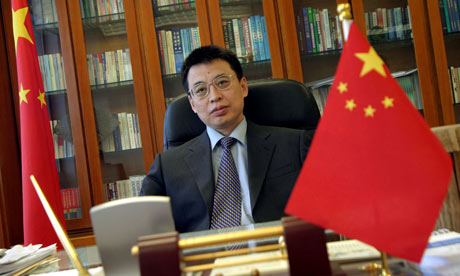China's green champion pushed to sidelines
Poor health blamed for inactivity of campaigner but environmentalists fear fall from prominence signals government change of direction
- guardian.co.uk, Thursday 12 March 2009

Pan Yue Photograph: NATALIE BEHRING/Natalie Behring
The Chinese government's most strident defender of the environment, Pan Yue, has been pushed out of the political limelight as policymakers ramp up plans to bolster the faltering economy with consumer incentives and industrial investment.
Formerly the most outspoken critic of polluting industries and the local governments that protect them, Pan has been quietly driven to the sidelines in recent months.
Environmentalists fear his fall from prominence could signal a change of direction by the Chinese government and a weakening of the power of the environment protection authorities less than a year after they were upgraded to ministry status.
At an awards ceremony in December he explained his silence had been due to ill health, but environmentalists suspect a more political reason. "He doesn't look sick to me. I don't think health is the problem," said Feng Yongfeng, an influential environmental journalist. "People are saying that it is because the government will launch lots of projects to save the economy. If Pan was in power, he'd probably interfere with these projects."
Pan has lost authority over environmental impact assessment approvals, cut down media appearances and admitted that his pioneering "Green GDP" project has been shelved.
The environment ministry denies compromising over the environment to boost the economy. "We'd rather be seen as the bad guy at the moment than make our way into the history as sinners," Wu Xiaoqing, who replaced Pan last year as spokesman on the environment, said this week. "We must be very strict in applying environmental standards."
Since taking his post in 2003, Pan had been at the forefront of widely praised government initiatives to build an "eco-civilisation" by shifting the world's fastest growing economy on to a more sustainable track.
Until his arrival, the environment agency was seen as toothless, but Pan astounded many observers by blocking billions of dollars worth of projects and warning publicly that the country's economic development was in danger of hitting an ecological wall.
He harnessed the power of the media by naming and shaming the worst violators, introduced a freedom of information law that obliged local authorities to release pollution data and encouraged non-governmental organisations and journalists to expose environmental wrongdoing.
His actions – extraordinary in Chinese communist party circles – were possible thanks to support from the prime minister, Wen Jiabao, strong family credentials and the optimism generated by a fast-growing economy.
But he was passed over for promotion at the last party congress in 2007 and has since been steadily nudged into a quieter role on environmental education and "green economy" planning. As well as his removal last year from the position of environment spokesman, he lost the power to block projects that cause pollution, waste energy or hurt biodiversity.
Wu Xiaoqing is seen as someone more focused on the economy than the environment. He is a former deputy governor of Yunnan province, which is seeking environmental impact assessment approval this year for a cascade of huge dams on the Jingsha river, a major tributary of the Yangtze.
Despite its upgrade from agency status and a full vote-seat in the cabinet, the ministry of environmental protection remains small and has no jurisdiction over local environment protection bureaus, which are controlled by regional governments more concerned about their economies.
Tom Wang of Greenpeace said there was disappointment. "When the upgrade happened last year we were all very excited because it seemed a signal that the government is more concerned about environmental protection but I don't see any difference. Local environment officials are still getting their pay cheques from local governments."
Earlier this week, Friends of Nature questioned how the 4 trillion yuan economic stimulus package will be spent. Despite promises of new investment in renewable energy and "green buildings," they fear most of the money will go on steel, cement and other energy-intensive industries.
"Many projects, like roads and dams, pose a big risk to the environment so we need to take a close look at whether the environmental impact assessment systems are strictly being enforced," said Zhang Boju, a researcher with Friends of Nature.
In Yunnan and other provinces, local governments have introduced "green passage" regulations that fast-track environmental impact assessments in the interests of the economy.
In one of his few media appearances earlier this month, Pan said environmental impact assessments continue and the ministry would not allow high energy-consuming and polluting projects for the sake of domestic demand.


1 Comments:
nice post plz keep posting
http://envrionment.blogspot.com
Post a Comment
<< Home